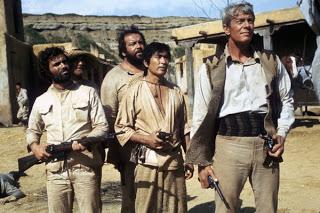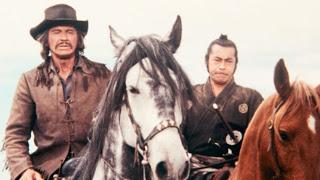The Five Man Army (1969, Don Taylor)
 The Five Man Army (1969) is an unspectacular men on a mission Western, The Professionals lite. While American director Don Taylor offers a smoother experience than most Spaghettis, the film isn't particularly memorable.
The Five Man Army (1969) is an unspectacular men on a mission Western, The Professionals lite. While American director Don Taylor offers a smoother experience than most Spaghettis, the film isn't particularly memorable.The Dutchman (Peter Graves), an American mercenary, hires four experts for a heist: old partner Nicholas (James Daly), wily bandito Luis (Nino Castelnuovo) strongman Mesito (Bud Spencer), Japanese knife-thrower Samurai (Tetsuro Tanba). It's the Mexican Revolution, and rebel leaders want the Dutchman to rob a train of government gold. The quintet plot their heist while debating
The Five Man Army's premise has been done before, and much better. Taylor and writer Dario Argento (!) elide any political content while borrowing familiar visuals of firing squads, fascist-lite villains, over-the-top action and trilling Ennio Morricone music. Army's first half is logy throat-clearing exposition, leaving the excitement for a prolonged climax. The elaborate heist leans more on tension than bloodshed, but it's capped by genre-standard backstabbing.
Peter Graves coasts through the film, delivering windy exposition and occasionally shooting someone. His costars fare much better: James Daly provides the film's conscience, and Testuo Tanba offers stoic support. Bud Spencer and Nino Castelnuovo steal the film, playing their roles with breezy, humorous charm. Their acting makes Army watchable, if underwhelming.
Red Sun (1971, Terence Young)
 Red Sun is far better, but how could it not be? Three international badasses in a cowboy-samurai tale is more meme worthy than a pirate-ninja showdown. Thankfully, Red Sun is as entertaining as the premise promises.
Red Sun is far better, but how could it not be? Three international badasses in a cowboy-samurai tale is more meme worthy than a pirate-ninja showdown. Thankfully, Red Sun is as entertaining as the premise promises. Outlaw Link Stewart (Charles Bronson) robs a train carrying Japan's Ambassador (Tetsu Nakamura) and a ceremonial sword. Link's lieutenant Gauche (Alain Delon) steals the sword, kills a samurai bodyguard and tries murdering Link in the bargain. Link teams up with survival samurai Kuroda (Toshiro Mifune), who's tasked with recovering the sword. The unlikely allies bicker and spar as they track Gauche, kidnapping his girlfriend Cristina (Ursula Andress) as bait.
Something like Red Sun was inevitable, given the interplay between Westerns and samurai films. Terence Young handles the material with seriocomic aplomb, allowing his stars to carry it. Charles Bronson shows a more playful side than his trademark stoicism. That falls to Toshiro Mifune, amiably sending up his Yojimbo persona. The stars have wonderful chemistry, pranking each other while debating the merits of sushi and Mexican liquor. It's the ultimate mismatched buddy film.
Young balances Bronson and Mifune's antics with excellent action scenes. Elaborate shootouts, like the opening train heist and a barnyard ambush, contrast with sillier moments, like Link and Kuroda's stick-katana duel. A later scene features Comanches chasing the heroes into burning cane fields, with beautiful images of the Indians riding amongst the grass. Young even pays homage to Kurosawa with Kuroda elaborately courting a courtesan and watching bandits through a wooden slat. Accompanied by Maurice Jarre's playful score, it's amusing without collapsing into farce.
Red Sun coasts on its premise, stars and action, its plot something like an afterthought. There's a long brothel interlude that's amusing but stops the story's momentum, while the belated arrival of hostile Comanches seems a convenient complication. Alain Delon's silky villain is underused, while Ursula Andress is merely a feisty damsel. Capucine's lusty madam makes a more appealing character. Still, Red Sun's so enjoyable that narrative lapses hardly detract from the fun.

